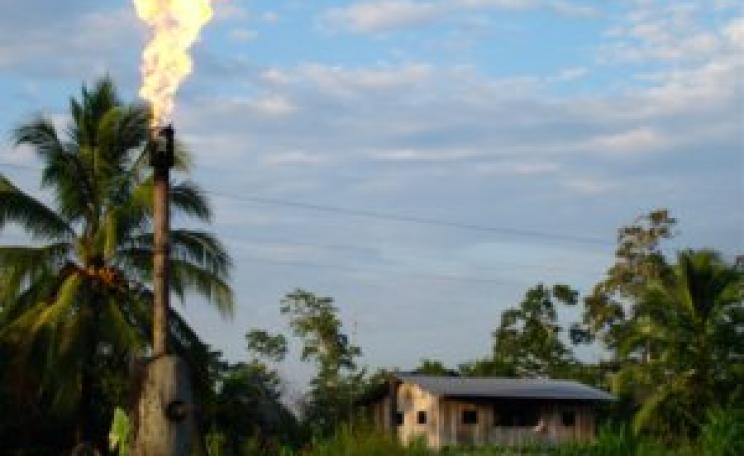The verdict in the trial of former Liberian President Charles Taylor, due on the 26th April, could set a significant precedent in attempts to prosecute individuals or corporations that trade in conflict natural resources. Taylor is being tried on 11 counts, the last of which is pillage, or conflict-related theft, prohibited in international humanitarian law in the 1949 Geneva Convention.
Funds from the illegal trade in diamonds and timber, used to purchase arms, were crucial to fuelling the conflict in Liberia, which left 200,000 dead and 2 million displaced. Andie Lambe, campaign leader for Global Witness's international justice team, told the Ecologist: ‘Pillage is the least well known and the least utilised aspect of international crimes used by prosecutors. While it's not a new tool, more people need to understand what it means. It's a very important avenue for redress but the first case to use it successfully will be significant.'
Ken Hurwitz, senior anti-corruption legal officer at the Open Society's Justice Initiative, said: ‘Jurisprudence is quite volatile at the moment, there are lots of cases going in different directions. The question really boils down to "If I'm buying timber from [former Liberian President] Charles Taylor, and I am therefore giving him money that he uses to arm and equip troops to commit human rights violations, do I share his intent to commit those violations, or is my intent to make money, and does that make a difference?"'.
Patrick Alley, of Global Witness, said that to date, efforts to hold corporations accountable have all but failed: ‘Wars from Liberia, to Sierra Leone or Angola all had a natural resource element to them and the exploitation of natural resources helped perpetuate the conflicts. Companies were knowingly doing business in these areas and trading in these resources. Unless this is dealt with, these companies essentially have impunity. They make a profit then leave the country, and the communities have the job of paying for it and picking up the pieces,' he says.
Global Witness and other civil society groups pursued the French subsidiary of Danish timber giant DLH through the courts for buying timber from Liberian companies that supported Taylor's regime. They argued that DLH was guilty of ‘recel', the French crime of profiting from goods obtained illegally. ‘We had to try and search jurisdictions to see where a case could be brought. We ended up trying a Danish company in France, all of which is illustrative of the fact that it is not easy. It's an ongoing process and it's taken years. The bottom line is that there never was any prosecution. Now those companies are marketing themselves as super responsible, with FSC certification and the like. Yet, years ago, they were involved in this dirty trade,' said Alley.
According to the United Nations, at least 18 violent conflicts in the last two decades have been fuelled by the exploitation of natural resources including timber, diamonds, gold, minerals, oil, land and water. In 2001, the UN General Assembly declared that the 6th November would henceforth be the ‘International Day for Preventing the Exploitation of the Environment in War and Armed Conflict'.
But if the environment has historically been the ‘unpublicised victim of war', lawyers and activists are now focusing their attention on a new legal tool to curb the conflict resources trade by prosecuting the corporations that are profiting from it. A major report, Corporate War Crimes: Prosecuting the Pillage of Natural Resources, by Professor James Stewart, launched at a conference on the same subject in the Hague last year, laid out a blueprint of jurisprudence to hold companies to account for their role in fuelling armed conflict.
Under the 'pillage theory', there is no requirement of intent to commit the violations that the resources allow to be committed, but rather, ‘an intent to purchase commodities or other assets from somebody who you know doesn't have legal title to them and in the context of an armed conflict,' said Hurwitz. ‘Although none of these cases are simple, we think this is a somewhat more direct and logical, and evidentially easier burden to satisfy on behalf of the prosecutor.'
As to why pillage theory itself was never really looked at before, Hurwitz says that in the context in which those situations initially arose, the post World War two cases were different enough from anything people were looking at contemporaneously. 'Nobody really looked but the jurisprudence wasn't really considered particularly on point to the situations human rights activist were focusing on. Then in the DRC [Democratic Republic of Congo] in particular, people were using the word pillage to refer to what was happening economically to the country but everyone was using it as a metaphor - nobody was using it as a technical legal term. Lawyers are sometimes very literal, so the thought was, well, what actually is the crime of pillage? So we looked and found this notion of receiving stolen goods as a type of pillage which seems to have common currency within the jurisprudence, certainly after the World War two period.'
While it is too early to gauge whether the ‘pillage theory' will penetrate into mainstream prosecutorial culture, Hurwitz says the launch of the report last year led to discussions with a number of authorities in ‘six or so' jurisdictions and he is aware of two or three places where the theory is being pursued actively. ‘We are in an unfortunate situation with the global economy. Prosecutorial agencies are having budget cutbacks meaning there are disincentives for a prosecutor to pursue a new and risky approach to litigation taking on what are probably politically controversial and deep pocketed defendants.'
Even so, 'the UN peacekeeping missions in [Liberia and the DRC] cost of hundreds of millions,' according to Patrick Alley. 'If it had been impossible to launder those natural resources onto the market, it is hard to quantify how much but the impact would have been far less. I would argue that in a sense the international community is subsidising business operation in conflict zones.'
| READ MORE... | |
 |
HOW TO MAKE A DIFFERENCE 7 ways to help stop tropical deforestion & illegal logging A store like Walmart can wield more power than a country over a logging company - especially in the global South. But what's good for Walmart is not always good for the planet. Peter Dauvergne & Jane Lister outline 7 key tools for retailers to limit the impacts of timber consumption |
 |
COMMENT Revealed: how the Vietnamese military fuels destruction of Laos' forests Undercover filming by the Environmental Investigation Agency has unearthed shocking evidence of military involvement in the illegal timber trade, all to feed western demand for stylish wood products, according to Faith Doherty |
 |
NEWS ANALYSIS Global Witness quits Kimberley Process as Zimbabwe 'blood diamonds' exported Consumers could unwittingly buy rings or other jewellery linked to serious human rights abuses after Kimberley Process fails to prevent the sale of diamonds from Robert Mugabe's Marange diamond fields |
 |
INVESTIGATION Trade in precious minerals and timber continues to fuel violence and conflict across the globe Revenues obtained from the often illegal extraction and supply of commodities such as timber and diamonds are directly bankrolling corrupt regimes and armed insurgency groups, and fund the purchase of weapons and other contraband goods that perpetuate cycles of conflict. |
 |
HOW TO MAKE A DIFFERENCE Environmental Investigation Agency: meet the original eco spooks The EIA has been at the forefront of investigative campaigning for over 25 years, tackling the illegal wildlife trade, timber trafficking and ozone-depleting CFCs. Matilda Lee gets a debriefing |








